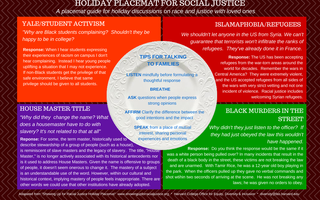Peter Maurer, President of International Committee of the Red Cross, emphasized the importance of concerted international attention to address the ongoing humanitarian crisis in Syria at the Institute of Politics Wednesday.
The tumultuous war in Syria has led to internal displacement of 10 million Syrians and has resulted in four and a half million refugees, according to Panelist Michael G. Ignatieff, a professor of the practice at the Harvard Kennedy School. Amid the crisis, organizations including the Red Cross have been actively working to provide humanitarian support.
“We are relatively good in delivering water and sanitation services in Syria. It’s covering large part of the territories,” Maurer said at a panel in the John F. Kennedy Jr. Forum.
While Maurer said the Red Cross is making progress in that field, he underlined the “complete struggle” to provide medical services to Syrians.
Still, Maurer highlighted the struggles of promoting humanitarian efforts in Syria and the struggle to balance negotiations with both the Syrian government and the rebels.
“Both sides were watching scrupulously. When one package is unloaded from the truck that in the other part there would also be another package unloaded,” Maurer said. “It’s constant on-spot, real-time negotiation.”
Ignatieff called the Syrian refugee a “humanitarian and strategic catastrophe” and said the war in Syria was a “geostrategic issue”.
He argued that the United States should admit more Syrian refugees, having allowed about 3,000 in its borders since the beginning of the crisis in 2011. Last September, Ignatieff penned an op-ed in The New York Times urging countries outside of Europe to take on more Syrian refugees.
At the panel, Ignatieff also pointed to the need for more resources for organizations operating in the war-torn country.
“Large international organizations like Red Cross, UNHCR and World Food Program have done their best, but they are underfunded,” he said, using an acronym for the United Nations High Commissioner for Refugees, the U.N.’s refugee agency.
Jacqueline Bhabha, a professor of the practice at the Harvard School of Public Health who moderated the panel, said the event, featuring “deep thinkers” like Maurer and Ignatieff, should allow people to think critically about the humanitarian cause of addressing the Syrian refugees crisis. Bhabha is also the chair of the Committee on Ethnicity, Migration, and Rights in the Faculty of Arts and Sciences.
Attendee Margaret M. Irving ’17 said she enjoyed the panel.
“It’s amazing to see such amazing speakers like this and I think it provides great insight into the people who are really trying to effect change in a very difficult situation,” she said.Read more in News
Scrambling Seniors Look to OCS for Job HelpRecommended Articles
-
Room for MoreLeaving four million refugees to suffer in the poor living conditions of refugee camps with little in the way of resource or recourse is not an option.
-
Welcome With Open ArmsToday, we as a nation are faced with a choice: We can respond with compassion or with fear. We must resist the temptation of the latter.
-
Cambridge Council, Students Resolve To Support RefugeesThe Cambridge City Council voted on a resolution several weeks ago condemning Massachusetts Governor Charles D. Baker ’79 for his public statement against the state allowing Syrian refugees to enter.
-
 The Placemat Problem
The Placemat Problem -
Humanitarian Panel Probes Into Healthcare Challenges in SyriaHumanitarian aid experts debated how to provide medical care in Syria at a panel at the Kennedy School of Government Thursday afternoon.













